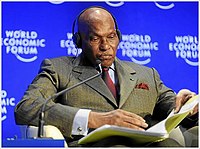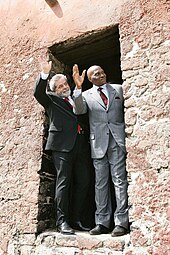Abdoulaye Wade
Abdoulaye Wade (French pronunciation: [abdulaj wad]; born 29 May 1926) is a Senegalese politician who served as the third president of Senegal from 2000 to 2012.
[2] Wade attracted international attention in the wake of Senghor's announcement in late 1980 that he would resign; as the Secretary General of the PDS, he issued a statement denouncing the process and calling instead for the army to oversee a new set of elections.
[8][12] Following the May 1993 killing of Constitutional Council Vice-President Babacar Sèye, Wade, along with other PDS leaders, faced police questioning.
[12][14] On 1 October, Wade, his wife, and two PDS members of the National Assembly (Abdoulaye Faye and Ousmane Ngom), were charged with complicity in the murder, although they were not held in custody or put on trial.
[22] Final results released on 11 March 2007, showed Wade winning in the first round with 55.9% of the vote, far ahead of his nearest opponents, Seck with about 15% and Socialist Party leader Ousmane Tanor Dieng with about 13.6%.
[23] Wade was sworn in for his second term on 3 April at the Leopold Sedar Senghor Stadium in Dakar, with many African leaders and about 60,000 spectators in attendance.
[24] The main opposition parties did not accept Wade's 2007 victory and disputed his legitimacy as President; they boycotted elections to the National Assembly and the re-established Senate later in the year.
Wade conclusively stated in an interview published by Le Soleil on 19 May 2008 that there was no longer any possibility of dialogue with the opposition unless it recognized him as the legitimate President.
[33] After the first round vote, Abdoulaye Wade acknowledged on 27 February 2012 that he had failed to win a majority in the election and would have to face a run-off.
It was pointed out that the leaders ruling some of Senegal's neighbors (including Guinea, Gambia and Guinea-Bissau) had all previously used the army to maintain their grasp on power.
Following his defeat in the presidential election, Wade remained at the helm of the PDS, even as a number of the party's key figures abandoned it.
The PDS won 12 seats in the vote, marking a tremendous decrease in the party's parliamentary representation, but Wade nevertheless said that he viewed the outcome as encouraging.
He said that, contrary to expectations from some quarters that the PDS would disappear after losing power, it had emerged from the vote as the largest opposition party and the only one with enough seats to form a parliamentary group.
[37] In 2015, despite being close to his 90th birthday, Wade brushed aside suggestions that he should retire, arguing that no credible younger men had come along to succeed him as head of the PDS and that his parents both lived and worked to an advanced age.
[42] In the July 2017 parliamentary election, the Wades and the PDS joined a large opposition alliance, in particular with Ousmane Sonko's Pastef and Khalifa Sall's Taxawu Senegaal.
[47] This includes commissioning a 160+ foot bronze statue (the African Renaissance Monument), for which Wade claims he is entitled to 35% of all tourist profits it generates because of the intellectual property for conceiving the idea.
[52] During the corruption charges levied against his son Karim Wade, Wade held a press conference at his home in 2015 in which he insulted and falsely accused his successor Macky Sall of being a "descendant of slaves", and that Sall's parents were "cannibals" who "ate babies" and "were chased out of the village" for cannibalism.
[55][56] Their son, Karim Wade, served as head of the national agency of the Islamic Organization Conference and subsequently was Minister of State for International Cooperation, Urban and Regional Planning, Air Transport, and Infrastructure from 2009 to 2012.
[citation needed] Their daughter, Sindjely Wade, worked as a Special Assistant to the President and has participated in many Paris-Dakar rallies.



